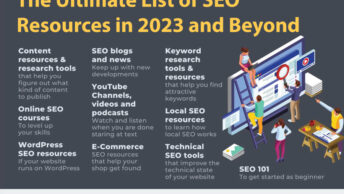Most website owners will be critically aware that a large portion of their visitor traffic comes from Google searches. That explains why there is so much emphasis on search engine optimization (SEO) and why unfortunately so many owners may have employed the services of pushy SEO consultants. The actions of such consultants operating on a massive scale has given an ongoing headache to Google in its attempts to display the most relevant web pages.
The main thrust of these SEO consultants’ efforts was to create huge numbers of backlinks to web pages since Google indicated that this was a key measure in its ranking method as measured by its patented PageRank approach. In recent years, the main weapons in Google’s armory have been its Panda and Penguin updates.
The Penguin Updates Target Backlinks
The Penguin update is the easier of the two to understand. People were trying to raise the ranking of their web pages by creating thousands of other websites that would have hyperlinks pointing towards the target web pages. The Penguin updates attempt to find such massive networks and downgrade their value in the search algorithm.
When many website owners protested at this treatment, Google offered a links disavowal process whereby they could attempt to remove these negative influences on their search ranking. This apparent goodwill on Google’s part was treated with some skepticism since many felt they would then be labelled as spammers and could never remove this unfortunate label.
Google Search Ranks Web Pages
In this discussion, it is important to remember that Google ranks web pages and presents single web pages when it displays the results of keyword searches and queries. The Panda updates break away from this tradition by attempting to determine whether a website as a whole is a high quality website or not.
Apparently this was developed by having human reviewers rate particular websites for quality. Algorithmic methods were then used to see whether these could predict the quality readings determined by the human reviewers. Panda was the name of the Google staff member who suggested this approach.
Remember Panda Was Once Called Farmer
The Panda update was first called the Farmer update. This was not as you might have suspected because it attempts to separate the sheep (the good websites) from the goats (the poor websites). Rather it was dealing with massive websites which are known as content farms. Here is a list of some of the most affected:
- answerbag.com
- answers.com
- blippr.com
- hubpages.com
- about.com
- mahalo.com
- wisegeek.com
- associatedcontent.com
- buzzle.com
- suite101.com
- ezinearticles.com
- freedownloadscenter.com
- articlesbase.com
- lovetoknow.com
- faqs.org
- examiner.com
- essortment.com
- helium.com
- merchantcircle.com
- ask-leo.com
- findarticles.com
- livestrong.com
- howtodothings.com
- tradekey.com
- thefind.com
- americantowns.com
- business.com
- doityourself.com
- trails.com
- fixya.com
- allbusiness.com
- quora.com
- instructables.com
- facebook.com
- huffingtonpost.com
- howstuffworks.com
- ehow.com
- answers.yahoo.com
- wikihow.com
Some of those names may surprise you but they were all affected.
The official word from Google as reported at SMX West shortly after Panda was launched was that low quality content on a part of a site can impact a site’s ranking as a whole. Google’s statement ran as follows:
Our recent update is designed to reduce rankings for low-quality sites, so the key thing for webmasters to do is make sure their sites are the highest quality possible. We looked at a variety of signals to detect low quality sites. Bear in mind that people searching on Google typically don’t want to see shallow or poorly written content, content that’s copied from other websites, or information that is just not that useful. In addition, it’s important for webmasters to know that low quality content on part of a site can impact a site’s ranking as a whole. For this reason, if you believe you’ve been impacted by this change you should evaluate all the content on your site and do your best to improve the overall quality of the pages on your domain. Removing low quality pages or moving them to a different domain could help your rankings for the higher quality content.
Remember that even if your own website is much smaller than these massive content farms, the same rules apply. Your work in removing low quality items may be much less onerous but is still essential.
Make Your Website Panda Proof, A Necessary Pre-Condition
At this point we see that the title of this article is perhaps too hopeful. If the current site is one that will suffer reduced rankings because of the Panda updates, then there is little merit in adding good pages on top of the rubbish. Google will devalue them by association.
There are many papers that have been written on how to work on a website to clear out whatever may be damaging in Panda’s eyes. Here is one list of items that are often suggested to make your website Panda proof:
- Make sure your website template is spacious.
- Don’t crowd too many adverts onto your page
- Improve your site’s loading speed
- Be Social
- Avoid thin content
- Avoid duplicate content
- Avoid duplicate meta descriptions
- Take care not to have duplicate tag pages
- Link out to other trusted websites.
- Avoid having too many affiliate links on a page.
- Poison Words (words or bigrams (pairs of words) that appear frequently on spam pages)
Remember that you should only move on and add new content once you are convinced that your existing content will be rated highly for quality.
Make Your New Web Pages Panda Friendly
Once you have established a quality foundation, how can you add to this web pages which are likely to be regarded with favor by Panda updates? Clearly at a minimum you should keep in mind the list suggested above for the existing website. However that is a minimum since you must remember that competitive web pages are also in the quality improvement game.
Two important factors in confirming your new web pages as Panda friendly are the following:
- Develop your authority as an author and confirm this by developing a presence and being active in social media
- Try to ensure that your web page has a certain uniqueness. This can be accomplished by including a new point of view or introducing novel concepts on the subject. As Eric Enge suggested, now that there is Google Panda Standout Content is Essential.
Panda Updating Is Ongoing So No Guarantees
The other point to bear in mind is that all elements in the Google search algorithm are in a sense works in progress. That goes for the Panda and Penguin updates too. As recently reported, Matt Cutts has confirmed that Panda rolls out monthly now over a period of 10 days in each cycle. Clearly the search for higher quality is never ending. That is the only way to stay ahead of the Panda updates.





